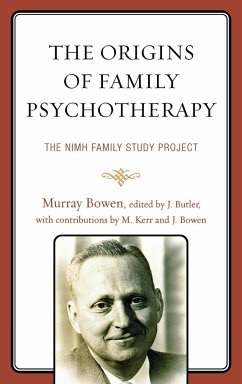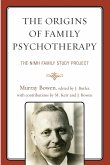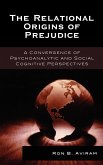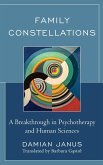Family therapy has become a well-established treatment modality across many mental health disciplines including clinical social work, psychology, psychiatry, nursing, and counseling. This book tells the story of how family therapy began based on the work of one of the pioneers of family theory and therapy, Murray Bowen, M.D. Bowen's psychiatric training began at the Menninger Foundation in 1946. It was during the later part of his eight years at Menninger's that he began his transition away from conventional psychoanalytic theory and practice. Bowen left Menninger's in 1954 and began a historic family research program at the National Institutes of Mental Health (NIMH) in Bethesda, Maryland. This program, called the Family Study Program, involved hospitalizing entire families on a specialized research ward. He was interested in families with a child diagnosed with schizophrenia. There were two central findings of Bowen's four year project. The first was the concept that the family could be conceptualized and treated as an emotional unit. The second, was family psychotherapy, which began as staff-family daily meetings on the inpatient unit. The findings of Bowen's project remain part of mainstream mental health practice today. From that project, Bowen went on to develop his well known eight interlocking theoretical concepts that continue to be highly influential both in mental health and business. Bowen's project also significantly transformed the therapeutic relationship. The psychotherapist tried to achieve a balance when working with the families by making emotional connections while staying out of intense emotional reactions. They also worked diligently to avoid psychologically replacing parents. This book details the story of how these transformative changes came about by highlighting the original papers of the project.
This book presents original papers from Bowen's NIMH Family Study Project with commentaries concerning the origins and developments of family psychotherapy and the beginnings of a new type of therapeutic relationship. Far from being historical relics, the Family Study Project documents are relevant today in understanding how theory is important in the conduct of therapy, and in the ongoing challenges to think systems with intense family problems.
Hinweis: Dieser Artikel kann nur an eine deutsche Lieferadresse ausgeliefert werden.
This book presents original papers from Bowen's NIMH Family Study Project with commentaries concerning the origins and developments of family psychotherapy and the beginnings of a new type of therapeutic relationship. Far from being historical relics, the Family Study Project documents are relevant today in understanding how theory is important in the conduct of therapy, and in the ongoing challenges to think systems with intense family problems.
Hinweis: Dieser Artikel kann nur an eine deutsche Lieferadresse ausgeliefert werden.








